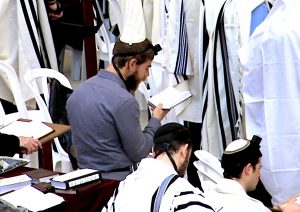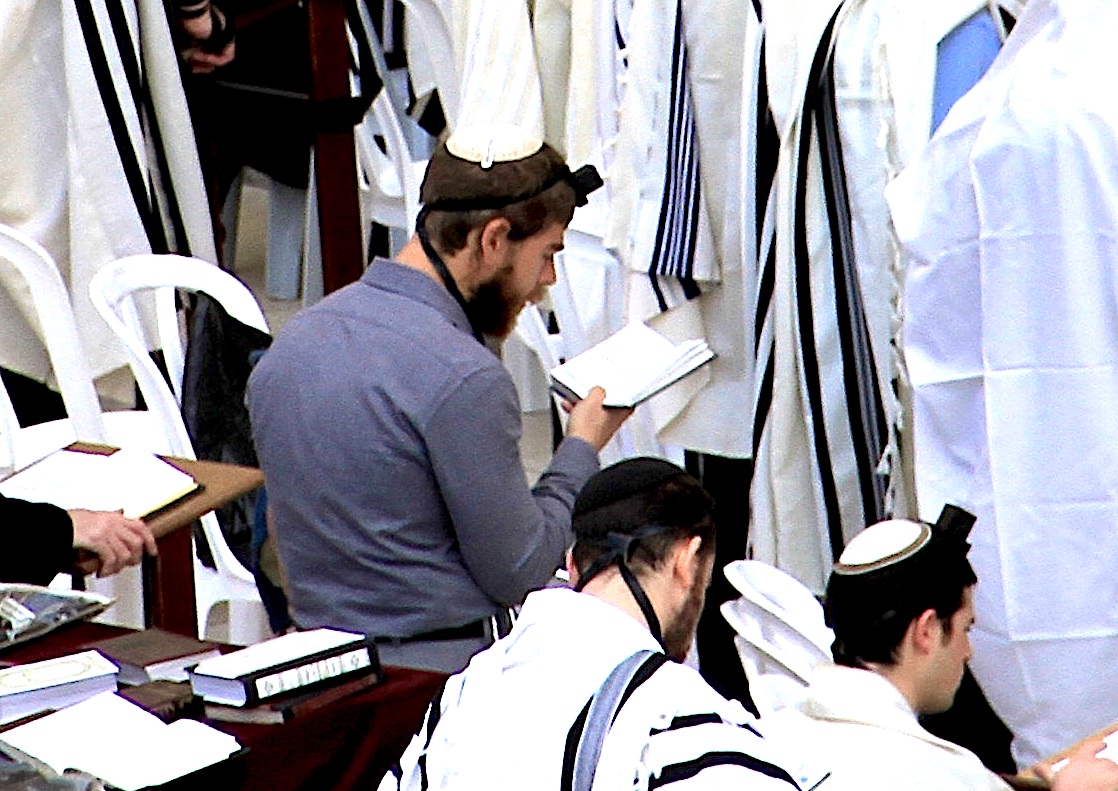

These divrei Torah were adapted from the hashkafa portion of Rabbi Yissocher Frand’s Commuter Chavrusah Series on the weekly portion: #1392 Wearing Tefillin on a Toupee or a Cast Good Shabbos!
Parshas Ki Savo begins with the mitzvah of bringing the first fruits to the Kohen in Yerushalayim and reciting Mikra Bikurim. The farmer presents his first produce of the season to the Kohen, and then thanks the Ribono shel Olam that he had a successful crop.
However, the farmer does not merely thank Hashem for giving him a successful crop, but rather his thank you begins even before Yetzias Mitzrayim: “V’anisa v’amarta Arami oved avi…”. He literally recites the entire first several hundred years of Jewish history from patriarchal times to the moment he now stands in the presence of the Beis HaMikdash. All of this is included in what is known as the parsha of Mikra Bikurim.
Now, in truth, this is a very familiar parsha to us, not necessarily because of Parshas Ki Savo and not particularly because it was read by every Jew upon bringing their first fruits to Yerushalayim, but primarily because it occupies a very large part of the Pesach Haggadah. A significant amount of Maggid during the Seder is devoted to analysis of all the nuances of each expression in these pesukim.
The general rule is that when we thank the Ribono shel Olam, we not only thank Him for what is before us now, but we also thank him for what brought us to this place. The question becomes, however, why did the author of the Hagaddah choose Parsha Ki Savo to provide for us a Biblical narration of Yetzias Mitzrayim? There are four parshiyos in Sefer Shemos that very elaborately describe the Egyptian experience and the exodus therefrom. These are Shemos, Vaera, Bo, and Beshalach. Admittedly, there are some extraneous matters discussed at the beginning of Sefer Shemos, but clearly, appropriate excerpts could provide a complete and succinct summary of the galus and geulah experience of Mitzrayim. However, the Baal Haggadah picks, for lack of a better word, somewhat of an obscure parsha to tell us this story. Why pick Ki Savo? Why not go to the ‘source’?
Rav Elya Baruch Finkel asks this question in his sefer and gives a very interesting answer: He says that Parshiyos Shemos, Va’era, Bo, and Beshalach are the history of Yetzias Mitzrayim. That is what happened. Mikra Bikkurim is not about what happened. It is an expression of Hakaras Hatov. It is an expression of gratitude and thanksgiving.
Yes, the Haggadah author is very aware of the beginning of Sefer Shemos. In fact, individual pesukim from those parshiyos are cited numerous times in the Haggadah, introduced by the words “k’mo she’ne’emar” (as it is written). But the overreaching theme of Maggid is about Thanksgiving, not about History, and that is what the parsha of Mikra Bikkurim is about. When we sit down at the Seder, we are motivated to say “thank-you” and that is best expressed by this parsha from Parshas Ki Savo.
This leads Rav Elya Baruch Finkel to an interesting question. On the pasuk “V’amarta eilav…” (Devorim 26:3) Rashi comments and says three words: “she’eincha kafui tova” (that you are not an ingrate). Why does Rashi say this in the negative – that you say this parsha so that you should not be an ingrate? Why not say this parsha for positive reasons: because I am a makir tova (one who recognizes his debt of gratitude)?
Rav Elya Baruch suggests something which is very true: A person can never be adequately makir tova to the Ribono shel Olam! There is just too much to thank Him for. It is every day. It is every minute. It is every second. Therefore, if someone thinks he can go ahead and recite these pesukim and fulfill his obligation to be a makir tova, he is way off base. That does not constitute sufficient gratitude! Granted, someone who recites this parsha is not a kafui tova (an ingrate); but he is still not a makir tova because he can never adequately reach the level of a makir tova.
This is an idea we say every Shabbos in the Nishmas prayer, starting with the words “Ilu finu maleh shirah k’yam…”:
Were our mouth as full of song as the sea, and our tongue as full of joyous song as its multitude of waves, and our lips as full of praise as the breadth of the heavens, and our eyes as brilliant as the sun and the moon, and our hands as outspread as eagles of the sky and our feet as swift as hinds – we still could not thank You sufficiently, Hashem our G-d and G-d of our forefathers, and to bless Your name for even one of the thousand thousand, thousands of thousands and myriad myriads of favors that You performed for our ancestors and for us…
If we would talk from now to eternity, we would not be able to adequately express our full hakaras hatov. That is what this parsha of Mikra Bikurim is about. Rashi is telling it like it is. Let no one fool himself into thinking that he has adequately expressed hakaras hatov to the Almighty. All this does (which is not something to belittle) is to avoid the label of being a kafui tova.
The truth of the matter is that there are certain individuals in the course of our lifetimes to whom the same thing applies (albeit, of course, not on the same level as to the Ribono shel Olam). People can never thank their parents sufficiently. It is just impossible. For many of us, this mussar observation arrives far too late in our lives to do anything about it. It is an observation that is more appropriate to share with my talmidim in the yeshiva.
But this is the reality of life. We all go to Bar Mitzvahs where the Bar Mitzvah boy says his p’shetel and then at the end he says, “I would like to thank bla, bla, bla, and I would like to thank my parents for making this wonderful Bar Mitzvah.” That’s it? How about the nine months that your mother carried you? How about the 2 AM feedings? How about all that it takes to raise a child and to support a child and to keep on supporting a child?
Just as “Ilu finu maleh shirah k’yam…” in Nishmas applies to the Ribono shel Olam, it applies to parents as well. The truth is that sometimes there are also other people whom we meet during our lifetimes who also change the trajectory of our lives such that proper hakaras hatov is not possible. But we all need to at least try to avoid the label of being kafui tova. Therefore, as much as we can, it is important to express those expressions of gratitude and hakaras hatov, in order to at least remove us from the category of being ungrateful.
The character flaw of being ungrateful is one of the worst possible middos a person can possess. The Brisker Rav once made an interesting observation on a pasuk in Parshas Ha’azinu. On the pasuk “Is it to Hashem that you repay this, O people who are vile and unwise (Am naval, v’lo chacham)? Is He not your father, your acquirer? He made you and established you” (Devarim 32:6). Moshe Rabbeinu chastises Klal Yisrael: This is how you pay back the Ribono shel Olam? Oh, you foolish nation (am naval) who is unwise! What does the term am naval connote? The Brisker Rav notes that when an animal dies without shechitah (ritual slaughter) it is called a neveilah. Such a creature ceases to be an animal.
The Brisker Rav says that a person who is not makir tov is a naval because he ceases to be a human being. This is a powerful vorte. There is a whole list of bad middos – haughtiness, jealousy, selfishness, temper, etc. But, says the Brisker Rav, a person with any or all of these bad middos has character deficiencies but he remains a human being, albeit a flawed human being. However, a person who is not a makir tova – is an am naval – ceases to be a human being. This is how profound and fundamental it is to show gratitude.
If that is the case, it stands to reason, that the greater a person is, the greater a makir tova he is. There are myriad examples of Gedolei Yisrael from throughout the ethnic and hashkafic spectrum who went to amazing lengths to be makir tov. They were big people and the bigger you are, the bigger makir tov you are.
I once read a story about Rav Yaakov Kamenetsky. There was a bochur in Torah Vodaas who did not come to minyan. The dormitory counselors tried everything under the sun to get him to come, but nothing helped. He would always sleep through minyan. They came to Rav Yaakov Kamenetsky and said that they want to throw him out of the dormitory. “Does the Rosh Yeshiva agree to this?” Rav Yaakov said, “Yes, if he is causing a laxness to prevail throughout the entire dormitory, we must not let him stay in the dormitory. But first send him to me. I want to speak to him before you kick him out.”
The dorm counselor came to this boy and told him that he was being thrown out of the dorm because he didn’t come to minyan, but that the Rosh Yeshiva wanted to see him first. The bochur was shaking in his boots that the Rosh Yeshiva wanted to see him for not coming to minyan. He walked into Rav Yaakov’s office, and the Rosh Yeshiva asked him, “So where are you going to sleep now?” The fellow said, “I really don’t know.”
Rav Yaakov said, “In that case, I want you to stay by me.” The boy got an upgrade! He went from the dorm to Rav Yaakov’s house! The boy said, “But, the Rosh Yeshiva threw me out of the dorm!” Rav Yaakov responded: “Your grandfather supported the Kovna Kollel where I learned when I was in Lita. Therefore, I owe your family hakaras hatov and therefore, you can sleep by me.”
But the most moving story I ever heard about an adam gadol who was makir tova was a story with Rav Elazar Shach, zt”l. It was a rainy winter day and Rav Shach called his grandson and told him “I want you to hire a cab to take me to a funeral in Haifa.” They got in the cab together and the grandson was thinking to himself “there must be some adam gadol in Haifa that my grandfather knew.” They came to the funeral parlor, and it turns out that it was the levaya of an old woman. There was barely a minyan, and the grandson couldn’t figure out why on earth his grandfather would go to this woman’s levaya.
Following the levaya in the funeral parlor, Rav Shach went to the cemetery in the pouring rain. He waited until the body was buried and he then recited Kaddish for this woman. He then stood there in the rain over the grave. The grandson was amazed at what he was witnessing. He could not figure it out. When they went back into the car, Rav Shach did not say anything. Finally, the grandson asked his grandfather: “Who was this woman?”
Rav Shach explained: When I was in Yeshiva in Europe, it was not like today that Yeshivas had dormitories. The boys learned in a shul. They spoke in learning with the Rav of the shul. That was the Yeshiva. The “dormitory” was the benches of the shul and there was a seniority system. The older bochurim and the ones who were in the “yeshiva” for longer were more likely to have a bench to sleep on. Rav Shach was the youngest bochur there, so he did not get a bench. He slept on the floor. In Europe, in the cold Lithuanian winter nights, it was freezing cold.
Rav Shach decided at one point “I can’t take this anymore!” Lo and behold, he received a letter from an uncle of his – a man who had no children. The uncle said in his letter “Listen, I am getting older. I don’t have any children. I have a business. I want you to come learn the business, and after I die, you will take over my business.” Rav Shach had decided in his mind that he was going to take this job! He just could not take the freezing cold any longer.
That night, a woman, whose husband had just died, got up from shiva. Her husband had owned a blanket factory. She came into the shul and asked, “Does anyone here need blankets?” Rav Shach said “Yes. I need blankets.” With the blankets on the floor and the blankets on top of him, his sleeping accommodations became “bearable.” He decided to stay—and became Rav Shach.
He told his grandson: This woman from Haifa was the woman who gave me the blankets in Lithuania so many years ago. Without this woman, there would be no Rav Shach, no Avi Ezri, no Ponevezh Rosh Yeshiva, no ‘Gadol Hador‘, no nothing! I kept track of this woman, even though this was decades later! So, when I heard she died, I felt I had to go to her funeral.
The grandson said, “Fine. I understand you went to the levaya, I understand you stayed for the kevura and you said Kaddish. But why did you remain out there standing over the grave in the rain after the burial was all over?” Rav Shach answered, “It is because I wanted to remember what it felt like to be cold. I wanted to fully appreciate what she did for me so many years earlier. That is why I stayed out there.”
A mensch who is not makir tova is not a mensch; but the bigger the mensch, the bigger the makir tova.
Transcribed by David Twersky; Jerusalem [email protected]
Edited by Dovid Hoffman; Baltimore, MD [email protected]
This week’s write-up is adapted from the hashkafa portion of Rabbi Yissochar Frand’s Commuter Chavrusah Series on the weekly Torah portion. A listing of the halachic portions for Parshas Ki Savo is provided below:
- 021 The “Ins and Outs” of Mezzuzah
- 066 Learning Hebrew: Mitzvah or Not?
- 111 Allocating Your Tzedaka Dollar
- 157 The Prohibition Against Erasing G-d’s Name
- 204 Giving a Sefer Torah to a Non-Jew
- 251 Shidduchim and Parental Wishes
- 294 Geirim and Davening: Some Unique Problems
- 340 The Pushka in Halacha
- 384 The Prohibition of Chodosh
- 428 Mentioning G-d’s Name in Vain
- 472 Teffilin Shel Rosh
- 516 Hagbeh
- 560 Selichos
- 604 Reading the Tochacha
- 648 The Onain and Kaddish
- 692 The Staggering Cost of Lashon Ho’rah
- 736 Your Aliya: Must You Read Along?
- 780 Can You Sue Your Father?
- 824 Hitting An Older Child
- 868 Loshon Horah Vs Lying – Which Is Worse?
- 912 Shaimos What I Do With All Those Papers?
- 956 The Phony Tzedakah Collector
- 999 Can Your Mother Serve You Dinner?
- 1043 Checking Mezzuzos: What Do You Do While They Are Down?
- 1087 Saying A Borei P’ri Ha’Adama On Fruit
- 1130 The Silent Shmoneh Esrei – Must It Be Silent
- 1172 Can One Remove His Mezzuzos When Moving To A New Home?
- 1216 Are Women Obligated in Yishuv Eretz Yisroel?
- 1260 Mezzuzah – Case of No Case; Kissing the Mezzuzah – Good Idea or Not?
- 1304 Erasing a Tatoo of the Shem Hashem – Davening for Personal Needs on Rosh Hashana
- 1348 All You Ever Wanted to Know About Hagbah
- 1392 Wearing Tephillin on a Toupee or a Cast
- 1436 But If We Punish Him He May Not Remain Frum
- 1480 Someone Dropped the Sefer Torah in Shul – Does Everyone Have to Fast?
- 1524 Kissing the Mezzuzah: Is it a Good Idea?
- 1566 Your Maaser Money – What Tzedaka Must it be Used For?
A complete catalogue can be ordered from the Yad Yechiel Institute, PO Box 511, Owings Mills MD 21117-0511. Call (410) 358-0416 or e-mail [email protected] or visit http://www.yadyechiel.org/ for further information.


